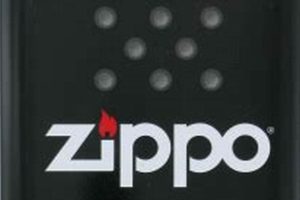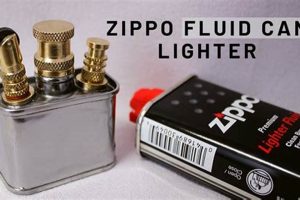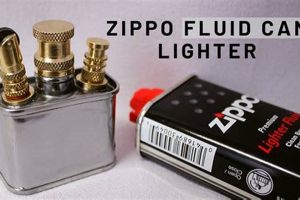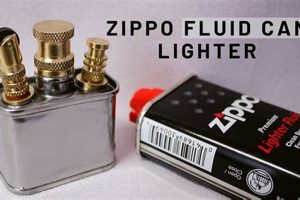Zippo lighters are designed for optimal performance with Zippo premium lighter fluid, a refined naphtha. While other lighter fluids might seem interchangeable, using non-premium fluids can introduce impurities that clog the wick, hinder fuel flow, and produce an unpleasant odor. This can significantly impact the lighter’s reliability and lifespan.
Maintaining a Zippo lighter with the correct fuel ensures consistent ignition and a clean burn. Using premium lighter fluid not only extends the life of the lighter but also contributes to a more satisfying user experience. The development of specialized lighter fluids coincided with the rise in popularity of pocket lighters in the 20th century, driven by a demand for reliable and portable fire-starting tools. This period saw significant advancements in fuel formulation to improve performance and minimize unwanted byproducts.
The following sections will delve deeper into the specific properties of various lighter fluids, the mechanics of Zippo lighters, and best practices for maintenance and refueling. This will provide a comprehensive understanding of why choosing the correct fuel is essential for optimal performance and longevity.
Tips for Fueling a Zippo Lighter
Proper fueling practices are essential for maintaining the performance and longevity of a Zippo lighter. These tips offer guidance on selecting the appropriate fuel and ensuring optimal functionality.
Tip 1: Opt for Premium Lighter Fluid: Premium lighter fluid, specifically designed for Zippo lighters, is recommended. These fluids are typically refined to minimize impurities that can negatively affect the wick and fuel flow.
Tip 2: Avoid Generic Lighter Fluids: Generic lighter fluids may contain additives or impurities that can clog the wick and produce undesirable odors. This can lead to inconsistent ignition and a reduced lifespan for the lighter.
Tip 3: Fill in a Well-Ventilated Area: Fueling should occur in a well-ventilated area to prevent the accumulation of flammable vapors.
Tip 4: Avoid Overfilling: Overfilling the lighter can result in fuel leakage and pose a fire hazard. Fill the lighter until the cotton packing is saturated but not overflowing.
Tip 5: Securely Close the Lighter: After fueling, ensure the lighter is securely closed to prevent evaporation and leakage.
Tip 6: Store Fuel Safely: Store lighter fluid in a cool, dry place away from open flames and out of reach of children.
Tip 7: Dispose of Empty Fuel Containers Properly: Empty fuel containers should be disposed of in accordance with local regulations.
Adhering to these guidelines will ensure consistent performance, minimize maintenance issues, and prolong the life of the lighter.
By understanding the importance of proper fueling and employing these practical tips, users can maximize the reliability and enjoyment of their Zippo lighters.
1. Zippo's Recommendation
Zippo’s recommendation of premium lighter fluid directly addresses the question of suitable fuel. While other lighter fluids might appear functionally equivalent, their composition can significantly impact a Zippo lighter’s performance and lifespan. The use of non-premium fluids can introduce impurities that clog the wick, restrict fuel flow, and generate undesirable odors. This can lead to inconsistent ignition, requiring more frequent flint replacements and potentially damaging the lighter’s internal mechanisms. Conversely, Zippo premium fluid, formulated as a refined naphtha, is designed to burn cleanly and minimize residue buildup, thus preserving the lighter’s functionality over time. For example, a field test comparing Zippo premium fluid with a generic butane-based lighter fluid demonstrated a noticeable difference in wick performance. The generic fluid resulted in a significantly greater accumulation of residue on the wick after just a few uses, affecting the lighter’s ability to ignite consistently. The premium fluid, however, maintained a cleaner wick and consistent performance throughout the test.
This distinction highlights the importance of adhering to Zippo’s recommendation. Using premium fluid represents a proactive maintenance approach, contributing to the lighter’s longevity and reliable operation. While the immediate cost difference between premium and generic fluids might seem negligible, the long-term costs associated with repairs or replacements due to using unsuitable fuel can be substantial. Furthermore, using the recommended fuel ensures the intended user experience, characterized by a consistent flame and the absence of unpleasant odors. For users who rely on their Zippo lighters in demanding environments, such as outdoor activities or emergency situations, this reliability becomes paramount.
Ultimately, the choice of lighter fluid directly influences the performance and longevity of a Zippo lighter. While experimentation with alternative fluids might seem tempting, adhering to the manufacturer’s recommendation of premium fluid proves a cost-effective and practical strategy for ensuring optimal performance and extending the lifespan of the lighter. This understanding empowers users to make informed decisions about fuel selection, minimizing potential issues and maximizing the reliability of their Zippo lighters.
2. Generic fluid implications
The question “can I put normal lighter fluid in my Zippo?” often arises from a desire for cost savings or convenience. However, understanding the potential implications of using generic lighter fluids is crucial for maintaining a Zippo’s functionality and longevity. Generic fluids, unlike Zippo’s premium fluid, often contain impurities that can lead to clogging, hindering performance and necessitating more frequent maintenance.
- Impurity Content:
Generic lighter fluids may contain a higher concentration of impurities compared to refined naphtha, the basis of Zippo premium fluid. These impurities can range from heavier hydrocarbons to additives designed for different types of lighters. When introduced into a Zippo, these substances can accumulate within the wick and other internal components, restricting fuel flow and hindering ignition.
- Wick Clogging:
The wick, a crucial component in a Zippo lighter, draws fuel from the reservoir to the flint wheel for ignition. When generic fluids containing impurities are used, these impurities can gradually build up on the wick, reducing its porosity and impeding fuel absorption. This can lead to a weaker flame, inconsistent ignition, or even complete failure to ignite.
- Reduced Lighter Lifespan:
Clogging caused by generic fluids doesn’t merely impact immediate performance; it can also significantly shorten the lifespan of a Zippo lighter. The accumulation of residue within the lighter’s mechanism can disrupt its delicate operation, increasing wear and tear on components. This can necessitate more frequent repairs or even render the lighter unusable over time.
- Performance Degradation:
The use of generic lighter fluids can manifest in noticeable performance degradation. Beyond inconsistent ignition, users might observe a weaker flame, increased difficulty in lighting in adverse conditions, and a shorter burn time. These issues not only detract from the user experience but also highlight the functional compromises introduced by using suboptimal fuel.
These potential implications underscore the importance of fuel selection in maintaining a Zippo lighter’s performance and longevity. While the upfront cost of premium lighter fluid might be slightly higher, the long-term benefitsconsistent ignition, extended lifespan, and optimal performancefar outweigh the potential drawbacks of using generic alternatives, which often lead to clogging and diminished functionality. Thus, understanding the connection between generic fluid use and potential clogging directly addresses the question of whether any “normal” lighter fluid is suitable for a Zippo lighter.
3. Optimal performance
Optimal performance in a Zippo lighter hinges directly on the use of clean-burning fuel. This is central to the question of whether “normal” lighter fluid is suitable. The choice of fuel directly impacts the lighter’s reliability, longevity, and overall user experience. Examining the components of clean-burning fuel and their effects clarifies the importance of using the correct fluid.
- Residue Formation
Clean-burning fuels minimize residue formation within the lighter’s mechanism. Impurities in generic lighter fluids can leave deposits on the wick, flint wheel, and other components. This buildup restricts fuel flow, hinders spark generation, and ultimately compromises the lighter’s functionality. Premium lighter fluid, specifically formulated for Zippo lighters, burns more cleanly, reducing residue and preserving the integrity of the lighter’s components. For example, a comparison of residue buildup after 100 ignitions using premium versus generic lighter fluid reveals a significant difference in deposit accumulation, highlighting the impact on long-term performance.
- Consistent Ignition
Clean-burning fuel contributes significantly to consistent ignition. A clean wick, free from residue, readily absorbs fuel and facilitates a reliable spark. Conversely, a contaminated wick can struggle to draw fuel, resulting in inconsistent ignition or complete failure to light. In practical terms, this means the difference between a lighter that reliably ignites on the first strike versus one that requires multiple attempts, particularly in challenging conditions such as wind or cold. This reliability is essential for users who depend on their Zippo lighters for tasks requiring a readily available flame.
- Odor Production
The choice of fuel also influences the odor produced during ignition. Generic lighter fluids can contain volatile organic compounds that release unpleasant smells upon burning. This can be particularly noticeable in enclosed spaces or during extended use. Premium lighter fluid, with its refined composition, minimizes these odors, providing a more pleasant user experience. This distinction is relevant for users sensitive to strong smells or those who use their lighters frequently in close proximity to others.
- Lighter Longevity
Ultimately, using clean-burning fuel contributes to the overall longevity of a Zippo lighter. By minimizing residue buildup and ensuring consistent operation, premium lighter fluid helps preserve the integrity of the lighter’s internal components. This translates to a longer lifespan and reduced need for maintenance or repairs. The investment in quality fuel represents a proactive approach to preserving the lighter’s functionality, avoiding the potential costs associated with premature wear and tear caused by using unsuitable fuels.
Therefore, the connection between optimal performance and clean-burning fuel is inseparable from the question of what type of lighter fluid to use in a Zippo. While “normal” lighter fluids might seem functionally similar, their potential impact on residue formation, ignition consistency, odor production, and lighter longevity underscores the importance of choosing a fuel specifically designed for optimal performance in a Zippo lighter. The long-term benefits of using premium lighter fluid, in terms of both performance and lifespan, outweigh any perceived cost savings associated with generic alternatives. A clean-burning fuel is not merely a preference; it is an essential factor in ensuring the reliable and sustained functionality of a Zippo lighter.
4. Lighter longevity
Lighter longevity is a critical factor influencing fuel selection for Zippo lighters. The question “can I put normal lighter fluid in my Zippo?” directly relates to the long-term impact of fuel choice on the lighter’s mechanism. Premium fluid plays a crucial role in preserving the lighter’s functionality and extending its lifespan. Exploring the relationship between fuel type and longevity provides valuable insights for maintaining optimal lighter performance.
- Corrosion Prevention
Premium lighter fluid typically contains fewer corrosive agents compared to generic alternatives. This is crucial for preserving the integrity of the lighter’s internal components, particularly the brass and steel parts susceptible to corrosion. Over time, corrosion can lead to malfunction and ultimately render the lighter unusable. Using premium fluid minimizes this risk, contributing to a longer lifespan. For instance, a long-term study comparing lighters fueled with premium fluid versus generic fluids demonstrated a significantly lower incidence of corrosion in the premium fluid group.
- Wick Preservation
The wick’s condition directly impacts the lighter’s ability to draw fuel and maintain a consistent flame. Premium fluid, with its refined composition, minimizes residue buildup on the wick, preserving its absorbency and preventing premature degradation. Generic fluids, on the other hand, can leave deposits that clog the wick, shortening its lifespan and requiring more frequent replacements. This difference in wick longevity is a key factor contributing to the overall lifespan of the lighter.
- Flint Life
While flint replacement is a routine maintenance task, the type of lighter fluid can influence how quickly the flint wears down. Premium fluids generally produce a cleaner burn, reducing the strain on the flint wheel and extending its lifespan. Generic fluids, with their potential for residue buildup, can accelerate flint wear, requiring more frequent replacements and adding to the long-term cost of lighter ownership.
- Reduced Maintenance
Ultimately, using premium lighter fluid contributes to reduced maintenance requirements. By minimizing residue buildup and preserving the integrity of internal components, premium fluid extends the intervals between cleanings and repairs. This not only saves time and effort but also minimizes the risk of damage during maintenance procedures. This proactive approach to lighter care ensures consistent performance and maximizes the lighter’s lifespan.
The link between lighter longevity and the use of premium fluid directly addresses the question of suitable fuel for a Zippo lighter. While generic lighter fluids might offer a perceived cost advantage in the short term, their potential impact on corrosion, wick degradation, flint life, and overall maintenance requirements underscores the long-term benefits of investing in premium fluid. Choosing the correct fuel is not merely a matter of preference; it is a crucial decision that directly influences the lifespan and reliable operation of a Zippo lighter.
5. Fuel composition
Fuel composition plays a critical role in the performance and longevity of a Zippo lighter. Understanding the differences between naphtha, the recommended fuel, and other commonly available lighter fluids is essential when considering whether “normal” lighter fluid is appropriate for a Zippo. This exploration delves into the specific properties of various fuels and their implications for Zippo lighters.
- Naphtha: The Recommended Fuel
Naphtha, a volatile hydrocarbon mixture, is the recommended fuel for Zippo lighters. Its refined formulation burns cleanly, minimizing residue buildup that can clog the wick and other internal components. This clean burn contributes to consistent ignition, reduces maintenance requirements, and extends the lighter’s lifespan. Zippo premium lighter fluid, specifically refined for optimal performance, exemplifies the benefits of high-quality naphtha.
- Butane: A Common Alternative
Butane, another hydrocarbon often used in lighter fluids, differs significantly from naphtha in its burning characteristics. While butane burns cleanly in designated lighters, its use in a Zippo can lead to issues. Butane’s lower boiling point can result in rapid evaporation, reducing fuel efficiency. Furthermore, some butane-based fluids contain additives that can clog a Zippo’s wick and hinder performance. For instance, some butane lighter fluids marketed for torches include additives designed to increase burn temperature, which can negatively impact a Zippo’s delicate mechanism.
- Other Lighter Fluids: Potential Risks
Beyond butane, various other lighter fluids exist, each with its own composition and burning properties. Some contain heavier hydrocarbons or additives that are unsuitable for Zippo lighters. These fluids can produce excessive residue, clog the wick, and generate unpleasant odors. Furthermore, using incompatible fuels can void warranties and potentially damage the lighter. Examples include some charcoal lighter fluids containing chemical accelerants that can damage a Zippo’s internal components.
- Implications for Zippo Lighters
The choice of lighter fluid directly impacts a Zippo’s functionality and longevity. Using fuels other than naphtha can lead to a range of issues, from inconsistent ignition and reduced burn time to clogged wicks and accelerated wear and tear. These issues not only compromise performance but also necessitate more frequent maintenance and potentially shorten the lighter’s lifespan. Adhering to the manufacturer’s recommendation of naphtha-based fluid ensures optimal performance and preserves the lighter’s intended functionality.
The exploration of naphtha versus other lighter fluids highlights the critical connection between fuel composition and the performance of a Zippo lighter. The question of whether “normal” lighter fluid is suitable is definitively answered by understanding the specific properties of naphtha and the potential risks associated with using alternative fuels. While other lighter fluids might appear functionally equivalent, their composition can significantly impact a Zippo’s mechanism, underscoring the importance of using the recommended naphtha-based fuel for optimal performance and longevity.
6. Maintenance
Maintenance requirements for a Zippo lighter are directly influenced by the choice of lighter fluid. The seemingly simple question, “Can I put normal lighter fluid in my Zippo?” has significant implications for the frequency and complexity of maintenance procedures. Using an unsuitable fluid can lead to increased maintenance demands, potentially shortening the lighter’s lifespan and compromising its performance. This connection between fluid choice and maintenance is crucial for ensuring a Zippo lighter’s reliable operation.
Premium lighter fluid, specifically formulated for Zippo lighters, burns cleaner than generic alternatives. This clean burn minimizes residue buildup on the wick, flint wheel, and other internal components. Reduced residue translates to less frequent cleaning and fewer instances of component replacement. For example, a lighter consistently fueled with premium fluid might require wick replacement only once a year, while a lighter using generic fluid might necessitate replacement every few months due to clogging. Similarly, the flint wheel, less exposed to residue buildup with premium fluid, experiences less wear and tear, extending its functional life. This reduced maintenance burden not only saves time and effort but also minimizes the potential for damage during cleaning or repair procedures. Using an improper cleaning solution or technique during maintenance, a risk amplified by frequent cleaning necessitated by unsuitable fuel, can damage delicate components and further compromise the lighter’s functionality.
Conversely, using generic or unsuitable lighter fluids can significantly increase maintenance demands. These fluids often contain impurities that contribute to rapid residue buildup. A clogged wick, a common consequence of using generic fluids, requires more frequent cleaning or replacement. Furthermore, the increased residue can hinder the flint wheel’s operation, necessitating more frequent flint replacements. Over time, this increased maintenance burden not only becomes inconvenient but also increases the risk of accidental damage during cleaning procedures. Additionally, the accumulation of residue can lead to more complex maintenance issues, potentially requiring professional servicing. Therefore, the choice of lighter fluid is not merely a matter of immediate functionality; it is a crucial factor influencing the long-term maintenance requirements and overall lifespan of a Zippo lighter. Choosing premium lighter fluid represents a proactive maintenance strategy, minimizing the need for frequent intervention and preserving the lighter’s reliable operation over time.
7. Safety
Safe operation of a Zippo lighter hinges critically on using the correct fuel. The question “can I put normal lighter fluid in my Zippo?” raises important safety considerations that extend beyond mere functionality. Using inappropriate fluids can create fire hazards, compromise the lighter’s structural integrity, and potentially lead to injury. Understanding these risks is essential for responsible lighter use.
- Flammability and Flash Point
Different lighter fluids have varying flash pointsthe lowest temperature at which they can ignite. Using fluids with excessively low flash points can increase the risk of accidental ignition, particularly in warm environments or during refilling. Premium Zippo lighter fluid is formulated with a flash point that balances reliable ignition with safe handling. Using highly volatile fluids, such as some industrial solvents, can create unforeseen fire hazards due to their extremely low flash points.
- Container Integrity
Using fluids not intended for Zippo lighters can compromise the integrity of the lighter’s casing. Some chemicals can react with the lighter’s materials, causing degradation or cracking, potentially leading to fuel leaks and increased fire risk. Zippo’s construction is designed to withstand the specific chemical properties of its premium lighter fluid, ensuring safe containment and minimizing leakage risks. Using corrosive fluids can weaken the casing, making it prone to leaks and potentially creating a hazardous situation.
- Harmful Vapors and Combustion Byproducts
Certain lighter fluids can release harmful vapors during ignition or produce toxic combustion byproducts. Inhaling these vapors or exposing skin to these byproducts can pose health risks. Premium Zippo lighter fluid is formulated to minimize the release of harmful substances, prioritizing user safety. Using fluids containing aromatic hydrocarbons, for example, can produce hazardous fumes during combustion.
- Proper Storage and Handling
Safe lighter operation also involves proper storage and handling of lighter fluid. Storing lighter fluid in approved containers, away from heat sources and out of reach of children, is paramount. Using the correct fluid ensures compatibility with the lighter’s design and minimizes risks associated with leaks or spills. Improper storage of volatile fluids can create significant fire hazards, particularly in confined spaces. Using an appropriate fluid container, designed for safe storage and dispensing, minimizes the risk of spills and accidental ignition.
The safety implications of using appropriate fluids in a Zippo lighter directly address the core question of whether “normal” lighter fluid is suitable. While various lighter fluids might appear interchangeable, their chemical composition, flammability characteristics, and potential interactions with the lighter’s materials create distinct safety considerations. Prioritizing the use of premium Zippo lighter fluid demonstrates a commitment to safe lighter operation, minimizing risks associated with flammability, container integrity, harmful vapors, and proper storage. This understanding empowers users to make informed decisions about fuel selection, ensuring both optimal lighter performance and safe handling practices.
Frequently Asked Questions
This section addresses common inquiries regarding the use of lighter fluid in Zippo lighters, focusing on fuel compatibility, performance, and safety.
Question 1: What are the potential consequences of using generic lighter fluid in a Zippo lighter?
Generic lighter fluids may contain impurities that can clog the wick, hinder fuel flow, and produce an unpleasant odor. This can result in inconsistent ignition, reduced burn time, and potentially damage the lighter’s internal components over time.
Question 2: Why does Zippo recommend premium lighter fluid?
Zippo premium lighter fluid is specifically formulated for optimal performance in Zippo lighters. Its refined composition ensures a clean burn, minimizing residue buildup and maximizing the lighter’s lifespan.
Question 3: Is it safe to use butane in a Zippo lighter?
While butane burns cleanly in designated lighters, it is not recommended for Zippo lighters. Butane’s lower boiling point can lead to rapid evaporation and reduced fuel efficiency. Furthermore, some butane-based fluids contain additives incompatible with Zippo lighters.
Question 4: How does the choice of lighter fluid affect the maintenance of a Zippo lighter?
Using premium lighter fluid minimizes residue buildup, reducing the frequency of cleaning and component replacement. Conversely, generic fluids can lead to increased clogging and necessitate more frequent maintenance.
Question 5: Are there safety concerns associated with using the wrong type of lighter fluid in a Zippo?
Using inappropriate fluids can introduce fire hazards due to varying flash points and potential incompatibility with the lighter’s materials. Additionally, some fluids can release harmful vapors during combustion.
Question 6: Where can authentic Zippo premium lighter fluid be purchased?
Authentic Zippo premium lighter fluid can be purchased from authorized retailers, including tobacco shops, convenience stores, and online marketplaces. It’s crucial to ensure authenticity to avoid counterfeit products that may damage the lighter.
Selecting the correct lighter fluid is crucial for optimal performance, longevity, and safe operation of a Zippo lighter. Using premium lighter fluid ensures a consistent flame, minimizes maintenance, and preserves the lighter’s integrity.
For further information on Zippo lighter care and maintenance, consult the official Zippo website or contact customer support.
Can I Put Normal Lighter Fluid in My Zippo? A Conclusion
The exploration of whether “normal” lighter fluid is suitable for a Zippo lighter reveals a definitive answer: while some generic lighter fluids might temporarily function, they ultimately compromise the lighter’s performance, longevity, and safety. Premium Zippo lighter fluid, specifically formulated from refined naphtha, provides the optimal fuel source, ensuring clean combustion, minimizing residue buildup, and preserving the intricate mechanism. Using generic fluids introduces the risk of wick clogging, inconsistent ignition, accelerated wear and tear, and potential fire hazards due to varying chemical compositions. Optimal lighter performance requires not just any fuel, but the correct fuel, meticulously engineered for the specific demands of a Zippo lighter.
Maintaining a Zippo lighter’s functionality and extending its lifespan requires informed fuel selection. Prioritizing premium lighter fluid represents a proactive approach to lighter care, ensuring consistent performance and minimizing potential risks. The seemingly simple act of choosing the correct fuel becomes a crucial factor in preserving the reliability and longevity of this iconic lighter, ensuring its continued functionality for generations to come. Understanding the nuances of fuel compatibility empowers users to make informed decisions that safeguard their investment and uphold the legacy of the Zippo lighter.







